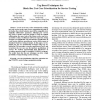Free Online Productivity Tools
i2Speak
i2Symbol
i2OCR
iTex2Img
iWeb2Print
iWeb2Shot
i2Type
iPdf2Split
iPdf2Merge
i2Bopomofo
i2Arabic
i2Style
i2Image
i2PDF
iLatex2Rtf
Sci2ools
114
click to vote
QSIC
2009
IEEE
2009
IEEE
Tag-Based Techniques for Black-Box Test Case Prioritization for Service Testing
—A web service may evolve autonomously, making peer web services in the same service composition uncertain as to whether the evolved behaviors may still be compatible to its originally collaborative agreement. Although peer services may wish to conduct regression testing to verify the original collaboration, the source code of the former service can be inaccessible to them. Traditional code-based regression testing strategies are inapplicable. The rich interface specifications of a web service, however, provide peer services with a means to formulate black-box testing strategies. In this paper, we formulate new test case prioritization strategies using tags embedded in XML messages to reorder regression test cases, and reveal how the test cases use the interface specifications of services. We evaluate experimentally their effectiveness on revealing regression faults in modified WS-BPEL programs. The results show that the new techniques can have a high probability of outperforming ran...
| Added | 21 May 2010 |
| Updated | 21 May 2010 |
| Type | Conference |
| Year | 2009 |
| Where | QSIC |
| Authors | Lijun Mei, W. K. Chan, T. H. Tse, Robert G. Merkel |
Comments (0)

